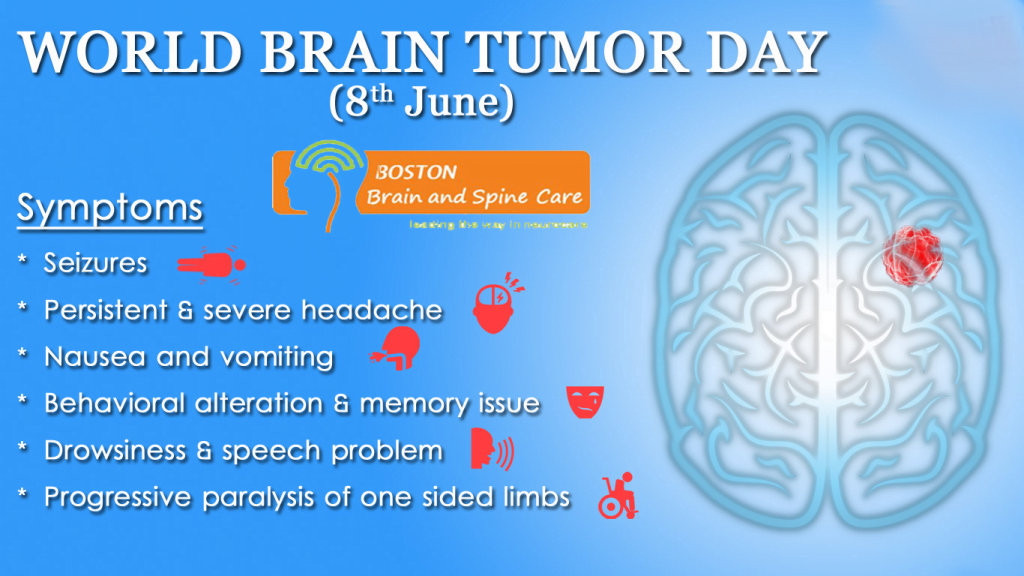
World Brain Tumor Day 2020: World Brain Tumor Day is observed on 8th June, every year. German Brain Tumour Association (Deutsche Hirntumorhilfe e.V.), a nonprofit organisation, first marked this day in the year 2000 to spread the awareness about the brain tumour among the general public. Deutsche Hirntumorhilfe was founded in 1998 and have more than 500 registered members from fourteen nations. It provides support to the patients and their family members besides scientists and health professionals.
History of World Brain Tumor Day:
Deutsche Hirntumorhilfe declared the World Brain Tumor Day in 2000 as an international commemoration day. World Brain Tumor Day is now celebrated annually on 8 June as a tribute to all brain tumour patients and their families.
What is Brain Tumour?
Before understading what is brain tumour, first we will learn about tumour. A tumour is basically an abnormal lump or growth of cells.
In the body, there are mainly two main types of tumours namely
• Benign
• Malignant
If the cells in the tumour are normal, it is benign (it means something wrong happened and the cells overgrew and produced a lump). If the cells are abnormal and start growing uncontrollably, then they are cancerous cells, and the tumour is malignant. A brain tumour occurs when abnormal cells produce within any part of the brain. The tumour can be Benign (non-cancerous) and Malignant (cancerous).
The cells in our bodies need to be able to heal to sustain life, whether that damage is from injury, sun radiation or chemicals that exist in our world. Sometimes that healing process goes wrong and small cancers can develop. Almost always, our immune system can find these early cancers and eliminate them, but rarely are they able to survive and grow larger, forming tumors or cancers. This can happen anywhere in the body, when they are in the brain or spinal cord they are called Central Nervous System (CNS) tumors.
Causes of Brain Cancer:
Any specific cause of brain tumour is not known yet. Many doctors believe exposure to radiations (like x-rays) for a long time can cause brain tumour. Some also believe that gadgets like mobile phones are causing various types of cancers including brain tumour, however, the fact is not proven yet. Many types of research into this field are still going on.
Symptoms of Brain Tumour
According to the data provided by National Health Portal (by the Ministry of Health and Family Welfare, Government of India), depending upon the location of the tumour on the part of the brain the symptoms may vary, some of the common symptoms are problems with vision, headaches, seizures, vomiting. Mental changes may be also observed. Sometimes the person may also feel difficulty in walking, speaking and sensation.
Diagnosis of Brain Tumour:
Depending upon the symptoms and history, doctors can use the following tests to diagnose the brain tumour
MRI and CT scan: Doctors may use these imaging techniques in the diagnosis of brain tumour.
Angiogram: It is also an imaging technique. In this test, a dye is injected into the bloodstream. If a tumour is present, then the image may show the tumour or blood vessels that are filling into the tumour.
Neurologic exam: This test includes testing of hearing, alertness, vision, muscle strength, coordination, & reflexes.
Spinal tap: In this test, a sample of cerebrospinal fluid is collected with the help of a long thin needle. This technique is known as lumbar puncture.
Treatments for Brain Tumour:
Depending upon the type, stage, condition and position of the tumours, doctors may suggest the following treatments:
• Surgery: It is the first step in the treatment of both benign & primary malignant brain tumours and is done on the patient to remove the maximum tumour so as to sustain neurological function
• Radiotherapy: In this process, cells are exposed to high energy beams of radiation.
• Chemotherapy: In this treatment, anti-cancer drugs are supplied to body to kill cancer cells.
• Steroids: These are frequently used for the treatment of brain tumours.
• Ventricular peritoneal shunt: This procedure is used to drain excess fluid from inside the brain.
How can we lower our risk for developing brain cancer?
There are no clear risk factors for developing most types of brain/spinal tumors other than some rare inherited/congenital cancer syndromes. More than 95 percent of patients we see have no clear risk factor or history for brain/spine tumor development.
How are treatment options different today from 10 years ago?
There are well over 100 different types of tumors which can arise from the brain/spinal structures and treatment can be very different for patients with different types/locations of tumors. For many we have made significant improvements in both treatments and outcomes, including newer surgical and radiation techniques which improve tumor control and reduce risk as well as novel chemotherapies which can be more effective than older medications. Ultimately, the goal is curing these tumors and unfortunately, we still have a lot of work to do to get there for many of our patients and their families. Despite this, there are many things we can do to help maintain hope and a good quality of life through the course of treatment. There are many options available, each with different expected benefits and side effects, and working with patients and their families to best balance treatment benefit with tolerability, in essence personalizing the treatment approach, is at the heart of neuro-oncology and the focus of what we do every day.
